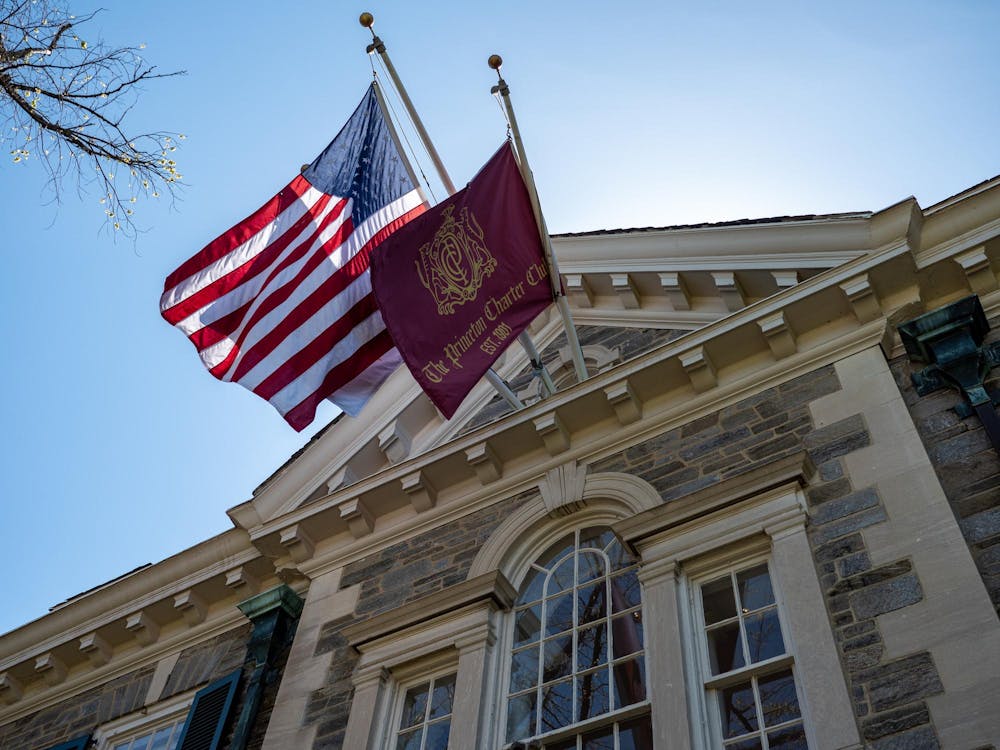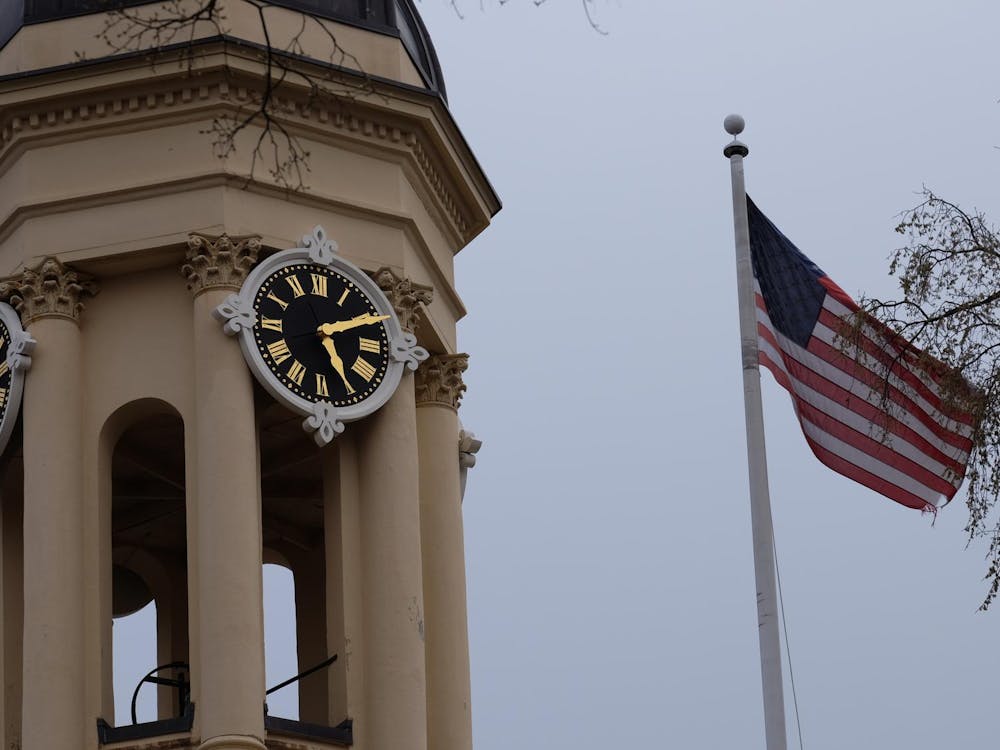On Feb. 14, just like many hundreds of other Princeton students, I stopped by my eating club — Charter — to have lunch. I brought two guests, one of whom is a professor who has taught me in several courses and is also my senior thesis advisor.
The lunch was pleasant and uneventful; it was Ash Wednesday, so neither my professor nor I ate very much. I was careful to follow the club’s internal procedure for sponsoring guests, filling out the appropriate guest meal slips under the supervision of a club staff member. After we finished, we went to class — he’s teaching a graduate seminar this semester in which I am a student.
I thought nothing more of it — until more than a month later on March 26, when Charter’s president, Anna Johns ’25, announced an abrupt change to the club’s visitors policy. In order to maintain an “inclusive environment” and communicate that Charter is a “sanctuary” for its members, Johns wrote in a club-wide group chat, visitors who are not family members or friends would henceforth not be permitted to enter the club during its “hours of food service operations” without prior approval from undergraduate officers, club staff, and the alumni Board of Governors.
Within minutes following the announcement, I learned from friends that the policy had been crafted in direct response to student complaints about my Feb. 14 lunch with my professor. After seeking out the club manager, I learned more: A “group of membership” — whose identities and precise numbers were unspecified — felt “caught off guard” when they saw my professor in Charter, and they were deeply upset by his presence. In the future, at minimum, they wanted “the right to not be in that space” at the same time as him. After receiving their complaint, the club acceded to their demands.
While the club manager attempted to assure me that the new policy was viewpoint-neutral and not meant to single out any particular “belief systems,” claiming it was merely intended to further the value of “inclusivity,” she declined to affirm that my professor would be permitted to enter Charter’s premises in the future. The undergraduate officers, the alumni board, and club staff would have to consult with one another “to make sure it’s okay” — and, even in the event his entrance was approved, a “general consensus notice” would have to be sent out beforehand to all Charter members, warning them of the date and time the professor would be in the building so they would have the opportunity to stay away.
Despite the club manager’s assurances, the claim that Charter’s new policy was neither ideologically-motivated nor intended to target anyone on the basis of their beliefs is clearly false. I have been a member of Charter for more than two years, and not once was I required to seek permission for the many external guests and visitors I brought into the club building. This new regulation was enacted in direct response to my hosting of a professor whose well-known, and well-reasoned, convictions are at odds with those of some of my fellow Charter members — and whose simple presence was evidently enough to make people feel unsafe.
But the notion that merely being in the vicinity of someone whose views you find objectionable qualifies as a legitimate threat to your safety, health, or well-being is patently absurd and should not be validated by any authority, Charter’s leadership included. It’s even more preposterous because the complainants did not speak to the professor or interact with him face-to-face. The simple fact that they had to eat lunch in the same building as him — a respected professor at this university who many Charter students have taken classes with and even praised — was too much to handle.
Adding on to the embarrassment is the fact that just seven years ago, Charter was using the prospect of dinner with this same professor to raise money for the club. According to Charter’s 2017 annual report, a “special Charter Club dinner” with the professor was arranged as a reward if the club met a fundraising benchmark. After the goal was met, the professor was “received enthusiastically” for dinner at the club with “25-30 undergraduate members and their guests,” who enjoyed “a very special evening with one of Princeton’s most impressive scholars” at the most “welcoming eating club in Princeton.” At some point within the past seven years, one of Princeton’s most acclaimed scholars and teachers went from honored guest to a threat to Charter’s “inclusive environment.”

On March 29, after I began circulating a petition to the club’s alumni board calling on them to revoke the policy, Johns sent a note to club members clarifying that “Charter is an inclusive private club that will never deny a member’s request to bring a guest to our sanctuary.” But her new announcement left the bulk of the policy — the requirements of prior approval and issuance of an advanced warning to all club members — intact. Indeed, even if the club’s leadership were to permit my professor — or another person whose opinions were disliked by some of my fellow Charter members — to enter the club at a specified time and place, the mandatory warning is risible.
I imagine it would look something like this ridiculous-sounding message:
Dear Charter Community: We are notifying you that Professor X will be attending lunch today at our club. We wanted to notify everyone so that you can take ample precautions to ensure you feel safe and can make an informed decision on whether or not to come to lunch today.
The fact that issuance of such a notification to all club members is now mandatory would be nothing short of laughable if it weren’t so disheartening. It was a grave error for Charter’s leadership to bend to the demands of a few students who couldn’t stomach the possibility of being within shouting distance of someone whose views challenge their own. No campus organizations, eating clubs included, should surrender to the proponents of illiberalism and ideological intolerance in the way that Charter’s leadership did here.

Indeed, seeking to suppress, punish, or exclude people with whom one disagrees — especially when they are people who are famous for making arguments, adducing evidence, and giving reasons — flies in the face of the intellectual posture of humble truth-seeking we as students are called to adopt. Such attitudes — which this policy condones — defy the spirit, if not the letter, of the University’s regulations protecting free speech and unencumbered discourse.
The eating clubs, like the University as a whole, must avoid becoming ideological echo chambers or so-called safe spaces where people go to avoid the risk of having their convictions or worldview challenged. Unfortunately, Charter’s new visitors policy — enacted to protect students from those whose ideas and mere existence they erroneously and ridiculously believe threaten their safety — does just the opposite. The new policy is intellectually indefensible and must be immediately revoked.
I’ll close, gentle readers, with a question for you. The fact that you will know the answer immediately tells you all you need to know about what’s really going on here. Who was the professor in the story? Was it Dan-el Padilla Peralta, whose presence was objected to by conservative Catholic and Evangelical students outraged by his rejection of their “traditional” beliefs? Or was it Robert George, whose presence was objected to by progressive students outraged by his relentless questioning of their left-wing ideological convictions?
Matthew Wilson is a senior studying political theory. He can be reached at mxwilson@princeton.edu.








